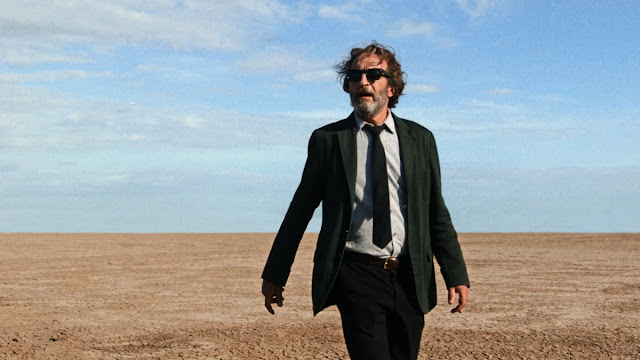Bardo, False Chronicle of a Handful of Truths
It seems premature at this stage of his career for director Alejandro Gonzalez Inarritu to make a movie like 2022's BARDO, FALSE CHRONICLE OF A HANDFUL OF TRUTHS, but that didn't stop Frederico Fellini from giving the world 8 & 1/2 after only, um, eight and one-half films. Or Bob Fosse from unleashing ALL THAT JAZZ after only less than half of that. Films about the plight of the artist and their subsequent guilt over success are plentiful, usually from someone who has experienced it firsthand. Inarritu has an impressive filmography, much of which I've seen. I guess he's experienced enough personally and professionally to warrant this two and one-half hour plus ego trip, an inward looking essay at the life of a successful journalist who went on to become an acclaimed documentary filmmaker. And oh, the existential crisis precipitated by learning that he is to receive an award in the U.S., the first Latin American to do so.
The character's name is Silverio Gama (Daniel Gimenez), and we know he is to represent our dear director. Keeping that in mind will either make this film an ordeal or open dimensions of intrigue. For some, BARDO will be unrelievedly pretentious, for others a wellspring of recognizance. I went both ways, depending on the scene. One moment I was involved in the characters' lengthy speeches of perception, the next I was embarrassed by Alejandro's leaden use of surreality. The style that was so swift and clever in BIRDMAN is often deadly here. Haphazard. We know Alejandro is skilled, but his staging of the 1847 Battle at Chapultepec Castle, occurring in present day while Silverio visits the American ambassador there, is just too cheeky for my taste. Or when the floor in a house turns to sand. Or when city folk randomly begin falling on the street. Or when Mateo, the baby he and his wife Lucia (Griselda Siciliani) had who died after only a few hours, keeps trying to push his way back in the womb. My first thought about this image was an old Woody Allen joke.
Silverio wanders through his past, interacting with his deceased parents (at different moments). I liked those scenes; they rang with some truth and were generally free of any cinematic trickery, aside from Silverio becoming child sized yet with his adult head while he chats with his father. The final scene involving Mateo was also quite powerful.
Expectedly, BARDO incorporates a timely thread about immigration, and while the film provides one effective scene it's not enough. The film is more concerned with the weight the artist bears of being unworthy. How culpable he feels for leaving his home country and moving to Los Angeles, where his privileged son Lorenzo (Iker Sanchez Solano) prefers to speak English. The teen makes a speech about his lack of motivation (because everything was given to him) and disconnect from his mother country. Others, including a talk show host, roast Silverio for his double standards and phoniness, charges that viewers can easily level at Innarritu and his film. But of course. That's the idea. Whether you want to watch such a psychotherapy session is up to you, invisible audience.
It all became tiresome early on. Too pleased with itself. The aforementioned self indictments are pointed, but if there was any effort at humility they entirely escaped me. Fellini was not blameless with his self-examination. Neither was Fosse. Yet both compelled us with their takes on themselves and their hang-ups and relational failures. Really flawed souls. Silverio is by contrast a decent chap whose greatest sin is that his head is so far up his ass he never took the time to remove it and relate to anyone else on a real level. Does that apply to Alejandro, too? For you to decide. I don't necessarily mind these kind of heady self-examinations (ALL THAT JAZZ is one of my favorite films), but Inarritu goes on too long and crams too much into the frame to make this analysis worthwhile, even as his visual ideas (and Darius Khondji's photography) are always good to look at.



Comments